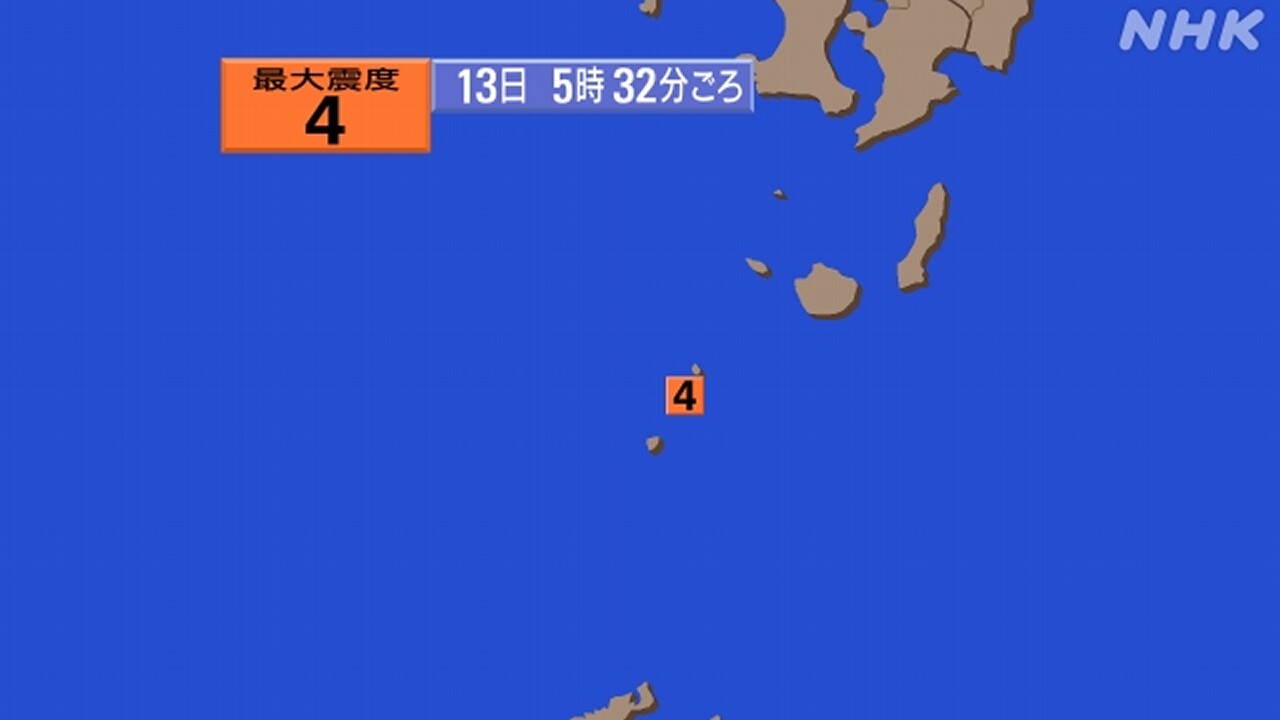Published: 2025-07-13 05:43
【地震情報】鹿児島 悪石島で震度4 津波の心配なし(5:32)

13日午前5時32分ごろ、鹿児島県十島村で震度4の揺れを観測する地震がありました。この地震による津波の心配はありません。
各地の震度は
▽震度4が悪石島で
▽震度2が小宝島
▽震度1が鹿児島県の奄美市、諏訪之瀬島でした。
気象庁によりますと、震源地はトカラ列島近海で、震源の深さは20キロ、地震の規模を示すマグニチュードは4.4と推定されています。
鹿児島県のトカラ列島の悪石島や小宝島付近では、先月21日から地震活動が活発になり、これまでに悪石島で最大震度6弱の揺れを観測しています。
今月6日には悪石島で震度5強の揺れを観測する地震が2回相次いで発生し、7日にも悪石島で震度5弱の揺れを観測する地震が起きました。
この地域ではおととしや4年前にも活発な地震活動がありましたが、震度1以上の地震回数は過去のケースを大きく上回っています。
気象庁は、当面、最大震度6弱程度の揺れを伴う地震に注意するよう呼びかけています。
| # | 言葉 | 意味 |
|---|---|---|
| 8 | 震度 | しんど (震度) : seismic intensity |
| 5 | 揺れ | ゆれ (揺れ) : 1. shaking; shake; jolt; jolting; vibration; tremor; flickering 2. unsettledness; instability; vacillating; wavering |
| 5 | 悪石島 | あくせきじま (悪石島) : Akusekijima (unclass) |
| 4 | 観測 | かんそく (観測) : observation; survey; measurement |
| 3 | 鹿児島県 | かごしまけん (鹿児島県) : Kagoshima prefecture (Kyushu) |
| 3 | 弱 | じゃく (弱) : 1. little less than; slightly fewer than; just under 2. weakness; the weak |
| 2 | 小宝島 | こだからじま (小宝島) : Kodakarajima (unclass) |
| 2 | 気象庁 | きしょうちょう (気象庁) : (Japanese) Meteorological Agency; JMA |
| 2 | トカラ列島 | トカラれっとう (トカラ列島) : Tokara Islands (chain of islands off the southern end of Kyushu) (place) |
| 2 | 活動 | かつどう (活動) : 1. activity (of a person, organization, animal, volcano, etc.); action 2. movie (esp. during the silent movie period) |
| 2 | 活発 | かっぱつ (活発) : lively; active; vigorous; animated; brisk |
| 1 | 十島村 | としまそん (十島村) : Toshimason (place) |
| 1 | 津波 | つなみ (津波) : tsunami; tidal wave |
| 1 | 各地 | かくち (各地) : every place; various places |
| 1 | 奄美 | あまみ (奄美) : Amami (fem) |
| 1 | 諏訪之瀬島 | すわのせじま (諏訪之瀬島) : Suwanosejima (place) |
| 1 | 震源地 | しんげんち (震源地) : epicenter; epicentre |
| 1 | 近海 | きんかい (近海) : coastal waters; adjacent seas |
| 1 | 震源 | しんげん (震源) : hypocentre (of an earthquake); hypocenter |
| 1 | 深 | み (御) : 1. august 2. beautiful |
| 1 | 規模 | きぼ (規模) : scale; scope; plan; structure |
| 1 | 示す | しめす (示す) : 1. to (take out and) show; to demonstrate; to tell; to exemplify; to make apparent 2. to point out (finger, clock hand, needle, etc.) |
| 1 | 推定 | すいてい (推定) : 1. presumption; assumption 2. estimation |
| 1 | 付近 | ふきん (付近) : 1. neighborhood; vicinity; environs; district 2. approaching |
| 1 | 相 | さが (性) : 1. one's nature; one's destiny 2. custom; tradition; habit; convention |
| 1 | 次ぐ | つぐ (次ぐ) : to rank next to; to come after |
| 1 | 発生 | はっせい (発生) : 1. outbreak; spring forth; occurrence; incidence 2. generation (e.g. of power or heat); genesis; origin |
| 1 | 起きる | おきる (起きる) : 1. to get up; to rise; to blaze up (fire) 2. to wake up; to be awake; to stay awake |
| 1 | 地域 | ちいき (地域) : area; region |
| 1 | 回数 | かいすう (回数) : number of times; frequency; count |
| 1 | 過去 | かこ (過去) : 1. the past; bygone days 2. one's past (that one would prefer remained secret) |
| 1 | 大きく | おおきく (大きく) : in a big way; on a grand scale |
| 1 | 上回る | うわまわる (上回る) : to exceed (esp. figures: profits, unemployment rate, etc.); to surpass; to be more than; to be better than |
| 1 | 当面 | とうめん (当面) : 1. current; urgent; pressing; impending 2. to confront (an issue); to face (up to something) |
| 1 | 程度 | ていど (程度) : degree; amount; grade; standard; of the order of (following a number); about; approximately |
| 1 | 伴う | ともなう (伴う) : 1. to accompany; to go hand in hand with; to be consequent upon 2. to be accompanied by; to bring with; to take with; to be involved in |
| 1 | 呼びかける | よびかける (呼びかける) : 1. to call out to; to hail; to address 2. to appeal |